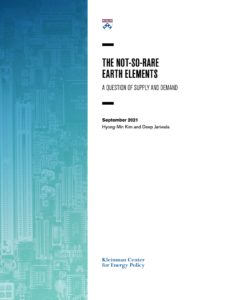Full Title: The Not-So-Rare Earth Elements: A Question of Supply and Demand
Author(s): Hyong-Min Kim, Deep Jariwala
Publisher(s): Kleinman Center for Energy Policy
Publication Date: September 23, 2021
Full Text: Download Resource
Description (excerpt):
Rare earth elements (hereafter referred to as REEs) is a collective term for seventeen chemical elements in the periodic table consisting of yttrium (Y), scandium (Sc), and the 15 elements of the lanthanide series (IUPAC 2005). Despite the name, REEs are not very rare and found far more commonly in the Earth’s continental upper crust than most precious metals such as gold (Au) and platinum (Pt). Some REEs such as cerium (Ce) are as abundant as industrial metals like copper (Cu) and nickel (Ni).
However, this abundance is distributed throughout the crust and is rarely found in concentrated deposits. REEs are therefore costly and energy intensive to extract. The four lightest REEs—lanthanum (La), cerium (Ce), praseodymium (Pr), and neodymium (Nd)—typically constitute more than 80% of these deposits, and heavier REEs such as europium (Eu), terbium (Tb), and dysprosium (Dy) are much more difficult to find (USGS 2021).
Rare earth elements are critical to several key industries and technologies, but 80% of their global supply is dominated by China. This report addresses the economic, geopolitical, environmental, and technological policy options for managing their future supply and demand.
